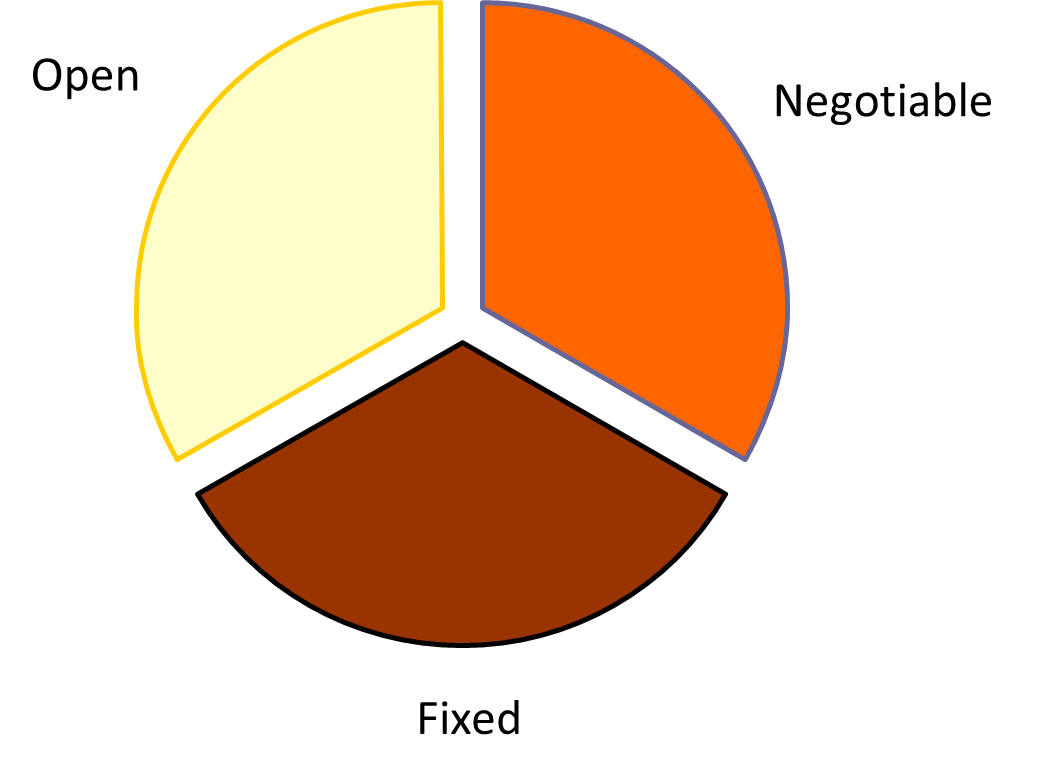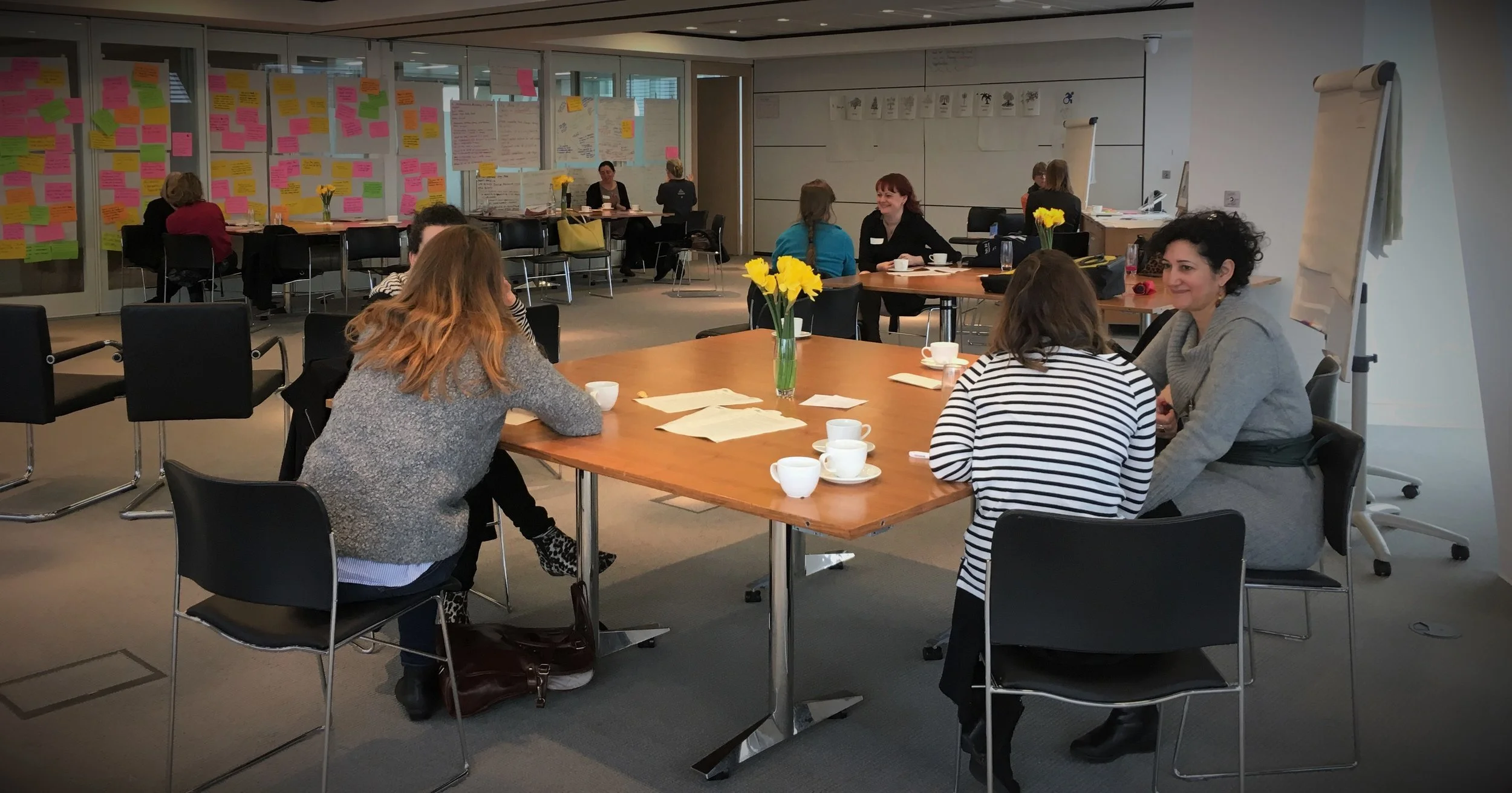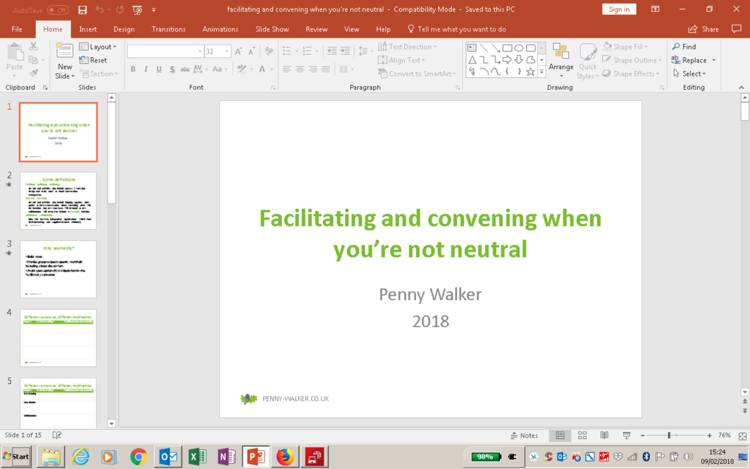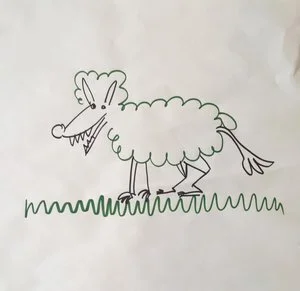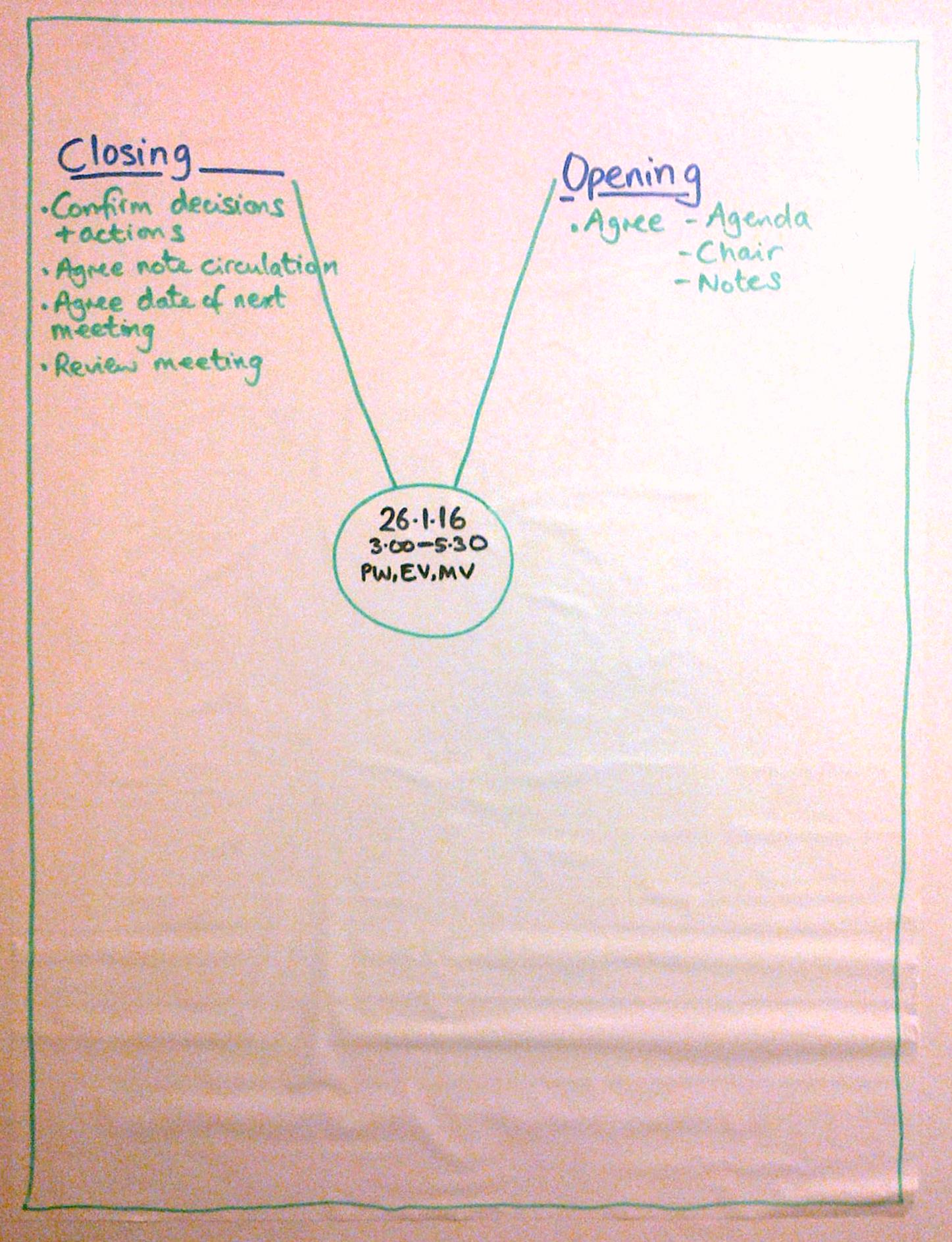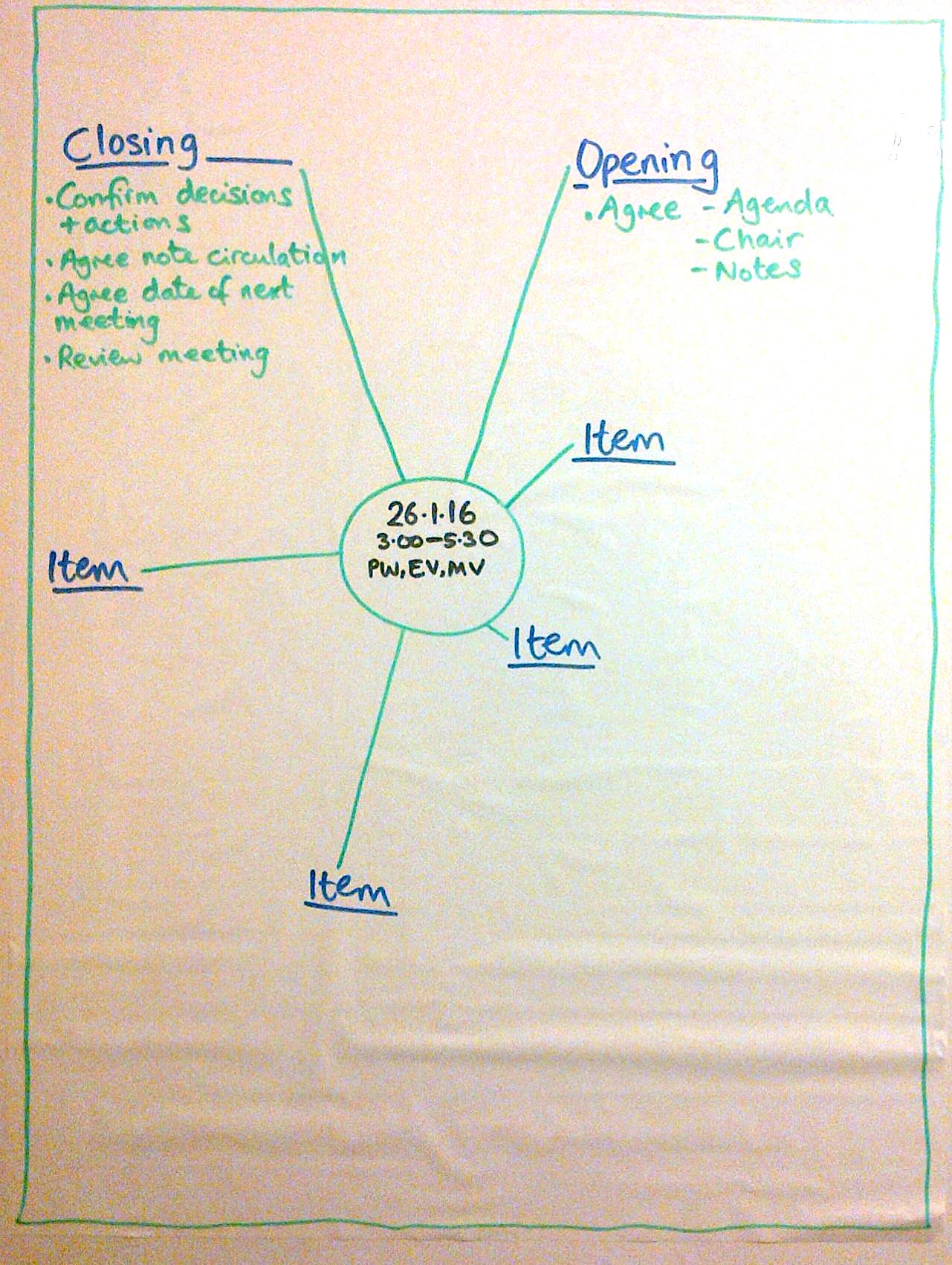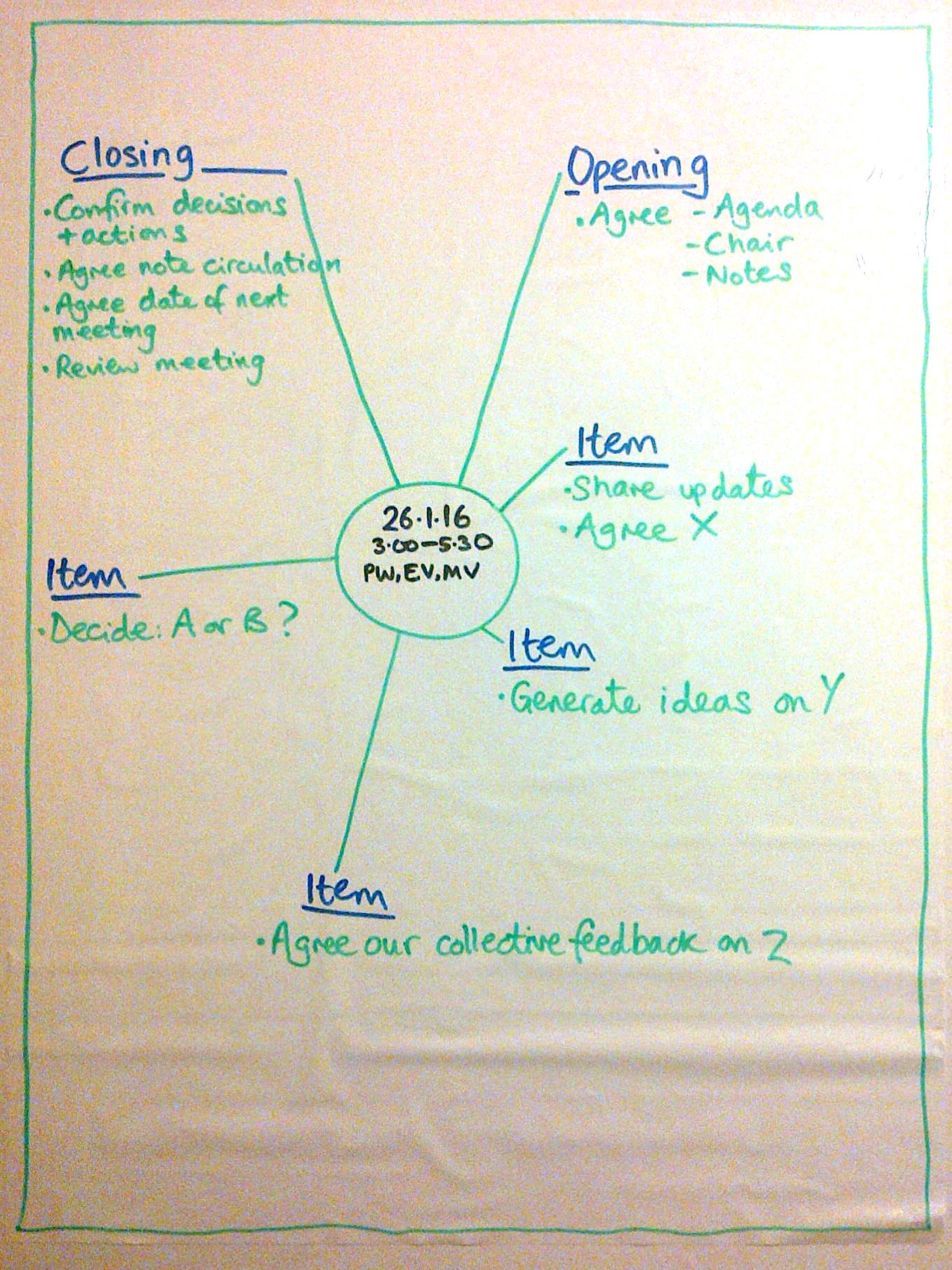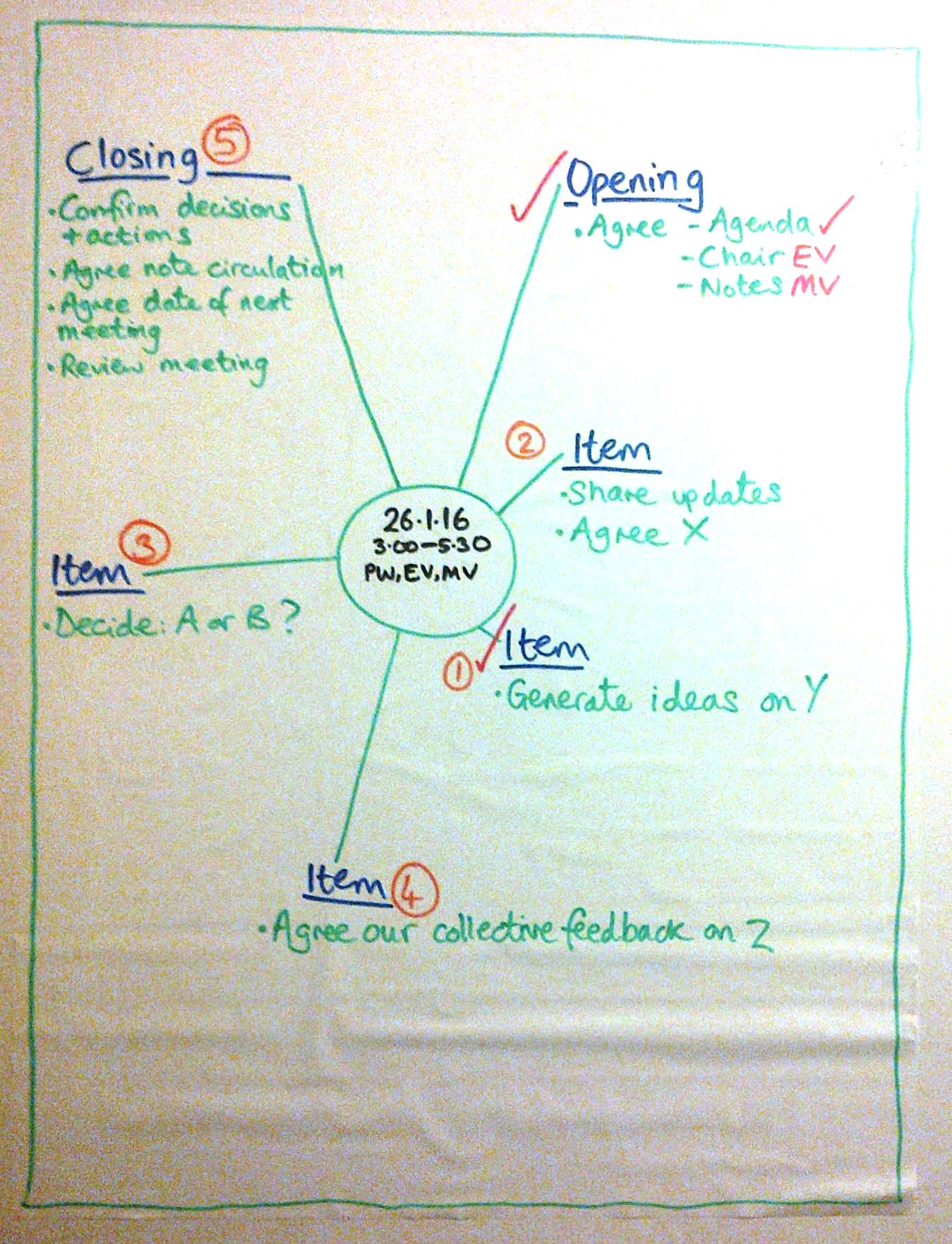Sometimes a group needs a fictional situation to catalyse its thinking, focus its conversations, or use as a training exercise. Here are some examples and tips for constructing great fictions.
Exploring white privilege
If you're white, you have almost certainly benefited from white privilege.
I know I have.
Recognising the specifics of our own experience of 'white privilege' is a step along the way to understanding the continuing impact today of the historical and systemic exploitation of non-European people and societies by Europeans and the societies they established in places like North America and Australia. I have been exploring my own white privilege, using a simple exercise.
How can we make our online events more beautiful?
When we set up 'real' rooms for participants, we use flowers, music, posters, objects, room layout and pay attention to countless little details, to create a beautiful, welcoming space which says "you matter" to participants. How can we do this online? Twenty facilitators, trainers, coaches and others joined a workshop to share ideas.
In-house facilitation training - what to think about
When clients come to me for in-house facilitation training, it’s such a great opportunity to create something which really supercharges people’s ability to have effective conversations about tricky things. There's some digging to do to unearth the treasure: what do you need to ask, to fit the training to what people most need to learn?
Reflections from the IAF Conference in Birmingham, 18th and 19th October 2019
There were around 100 facilitators in one room in Birmingham earlier this month – from all parts of Great Britain, also Ireland, Belgium, Netherlands, Italy, Spain, Portugal, Canada… What is the collective noun for facilitators?
All that and more in this round up of personal reflections on the IAF England & Wales Conference.
A postcard to my future self
Powerful tools for stakeholder engagement
Inventing techniques and exercises
Putting on my clown's trousers, with Sustainable Stand Up
Contemplating ecological apocalypse, and being really really angry with the bozos who are letting it happen, can make us sustainability people pretty dull conversationalists.
In a bid to learn some new ways of delighting people while helping them stare into the abyss, I enrolled in the marvellous Sustainable Stand Up course, run by my old friend and colleague - and all round laughter fairy - Belina Raffy with support from Dr Steve Cross.
Doing the work in sustainability that we want to do
Lots of the women who came along to She is Still Sustainable said that the highlight was a co-coaching exercise we ran, using a solutions focus approach. People paired up and coached each other, asking positive, future-oriented questions about the sustainability work they wanted to do. The instructions are here.
Facilitating and convening when you're not neutral
Many organisations in the sustainability field do their best system-changing work when they are collaborating. And they find themselves in a challenging situation - playing the role of convening and facilitating, whilst also being a collaborator, with expertise and an opinion on what a good outcome would look like and how to get to it. This dual role causes problems. Here’s how to fix them.
In-house facilitation networks - what makes them work?
Inside some organisations, there are networks of facilitators who design and run better meetings. Perhaps you are in such a network, or have worked with people who are. Perhaps you've designed and run training for people who go on to be part of such a network. These are, for the most part, people who facilitate either as a part of their job (and are given management support and time within their job to do this) or on top of their day job (having to carve out time informally, and doing it because they love it). They are not generally full-time facilitators.
Keep it sheepy!
acilitators need to stay out of the content- which belongs to the group - and intervene only to improve process. (There's more on this here: the neutral facilitator.) But sometimes we get tempted to smuggle in our own views when we question or reflect back to the group.
Still...... a new season of workshops for spring
What do we need now, from sustainability leaders?
When I got the news about the US Presidential election result, I went through a lot emotions that I'm still processing.
One that may have been shared by those of you who are looked to for leadership - in ways big or small - was uncertainty about what to say to people who are wanting guidance. I had to think about this pretty quickly, as I'd been asked present on leadership in the closing session of a four-day workshop on sustainable business.
Campaigners, community groups, activists and faith groups - run your business meetings better so you can get on with the important stuff!
If you're involved in a local group - campaigners, activists, community action, faith group - there will be some really important things you want to achieve in the world. And you'll have some kind of team, committee, council or similar organising the activities behind the scenes. How are those meetings? Clear, engaging, effective? Or dull, interminable, frustrating, repetitive?
I've led a couple of two-hour training sessions this year for groups on how to run meetings which make clear decisions that stick. So that they can spend time on doing the stuff that really matters.
Here are the handouts from the workshop I ran in mid November.
If you think your group would benefit, get in touch to see what I can do to help you.
Peer learning workshops - some emerging ideas
I'm excited about ideas for peer learning workshops that have been bubbling away in my head and are beginning to take shape.
Focused, coachy, peer learning
I want to bring together sustainability people of various kinds, to be able to talk with each other about their challenges and ideas in a more expansive and easeful way than a conference allows.
People really benefit from being able to think aloud in coaching conversations. I've seen the transformations that can happen when supportive challenge prompts a new way of looking at things.
We also get so much from comparing our own experiences with peers: finding the common threads in individual contexts, exploring ideas about ways forward.
I’d like to combine these things by making the peer learning available in smaller groups and smaller chunks, where the atmosphere is more like coaching.
What's the idea?
The idea is to run half-day workshops, with between 6 and 10 people at each event. The intention is that they are safe and supporting spaces, where people can talk freely. We'll meet in spaces that are relaxed, creative, private, energising and feel good to be in. (More comfortable than the stone steps in the picture.)
Each workshop would have a theme, to help focus the conversations and make sure people who come along have enough in common for those conversations to be highly productive.
I'd run a few, on different themes, and people can come to one, some or all of them. They don't have to come to them all, so the mix of people will be different for each workshop.
I'd charge fees, probably tiered pricing so that it's affordable for individuals and smaller not-for-profits, but commercial prices for bigger and for-profit organisations.
The content of each workshop will come from the participants, rather than me: my role is to facilitate the conversations, rather than to teach or train people.
Choices, dilemmas, testing
When I've tested this idea with a few people, many have said that the success of the workshops will depend on who else is there: people with experience, insight, credibility. People they feel able to trust, before they commit to booking. I think this is useful feedback.
On the other hand, I'm unsure about the best way to ensure this. Is it enough to include a description of "who these workshops are for" and leave it to people to decide for themselves? Or should I set up an application process of some kind: asking people who apply to include a short explanation of who they are, what their role and experience is, and why they want to come along.
If I set up an 'application' process, will that be off-putting to the naturally modest? Too cumbersome? Adding extra steps (apply, wait, get place confirmed, then pay...) feels risky: at each step, the pool of likely participants will get smaller. Will this make the workshops unviable? Who am I to choose, anyway?
Another option is to make the workshops 'by invitation' with people having the option of requesting an invitation for their friends, peers, colleagues - or even themselves. This is what I'm leaning towards at the moment, based on gut feel.
Will this increase people's confidence in the workshops - that not just anyone gets a place, their peers will provide quality reflections and be people worth meeting? Will it make those people who do get an invitation feel special, better about themselves?
And will I really turn down anyone who asks for an invitation? What will they feel?
I've set up a survey to gather views on this, as well as on the topics that will be most interesting to people. Please let me know here where's there a short survey. Discounts and prizes available!
How it feels to experiment
I'm not a natural entrepreneur. Some people love to experiment and learn from failure. Fail faster. Fail cheaper. Intellectually I'm committed to experimenting with these workshops: testing out ideas about formats, marketing, pricing, venues, topic focus vs emergence, length, the amount of 'taught' content vs 'created' content and so on.
Emotionally: not so much. I want to get everything right before I start (which is why it's taken me about six months to even get to this stage). I'm getting great support from lots of people, and boy do I need it. Even sitting here, I can feel the prickly, clammy, cold physical manifestations of the fear of failure.
I need to move through the fear and into the phase of actually running some test workshops. I know they'll be great. I can see the smiles, feel the warmth, visualise the kind of room we're meeting in and the I already have the design and process clear. I have a shelf of simple but beautiful props in my office. I am 100% confident about the events themselves, it's the communications and administration of the marketing that freaks me out.
Learning from the learning
So already I'm learning. About myself, about what people say they need, about how venues can be welcoming or off-putting, about how generous people are with their time and feedback.
Decisions? Decisions!
This blog post pulls together some resources that I shared at a workshop last week, for people in community organisations wanting to make clear decisions that stick. Groups of volunteers can't be 'managed' in the same that a team in an organisation is managed: consensus and willingness to agree in order to move forward are more precious. Sometimes, however, that means that decisions aren't clear or don't 'stick' - people come away with different understandings of the decision, or don't think a 'real' decision has been made (just a recommendation, or a nice conversation without a conclusion). And so it's hard to move things forward.
I flagged up a number of resources that I think groups like this will find useful:
- Descriptive agendas - that give people a much clearer idea of what to expect from a meeting;
- Using decision / action grids to record the outputs from a meeting unambiguously;
- Be clear about the decision-making method (e.g. will it be by consensus, by some voting and majority margin, or one person making the decision following consultation?) and criteria.
- Understanding who needs to be involved in the run-up to a decision.
- Taking time to explore options and their pros and cons before asking people to plump for a 'position'.
InterAct Networks - thank you for a wonderful ride
For over fifteen years, InterAct Networks worked to put stakeholder and public engagement at the heart of public sector decision-making, especially through focusing on capacity-building in the UK public sector. This work - through training and other ways of helping people learn, and through helping clients thinks about structures, policies and organisational change - helped organisations get better at strategically engaging with their stakeholders to understand their needs and preferences, get better informed, collaboratively design solutions and put them into practice. Much of that work has been with the Environment Agency, running the largest capacity-building programme of its kind.
History
InterAct Networks was registered as a Limited Liability Partnership in February 2002.
Founding partners Jeff Bishop, Lindsey Colbourne, Richard Harris and Lynn Wetenhall established InterAct Networks to support the development of 'local facilitator networks' of people wanting to develop facilitation skills from a range of organisations in a locality.
These geographically based networks enabled cross organisational learning and support. Networks were established across the UK, ranging from the Highlands and Islands to Surrey, Gwynedd to Gloucestershire. InterAct Networks provided the initial facilitation training to the networks, and supported them in establishing ongoing learning platforms. We also helped to network the networks, sharing resources and insights across the UK. Although some networks (e.g. Gwynedd) continue today, others found the lack of a 'lead' organisation meant that the network eventually lost direction.
In 2006, following a review of the effectiveness of the geographical networks, InterAct Networks began working with clients to build their organisational capacity to engage with stakeholders (including communities and the public) in decision making. This work included designing and delivering training (and other learning interventions), as well as setting up and supporting internal networks of engagement mentors and facilitators. We have since worked with the Countryside Council for Wales, the UK Sustainable Development Commission, Defra, DECC (via Sciencewise-ERC see p10), Natural England and primarily the Environment Agency in England and Wales.
Through our work with these organisations InterAct Networks led the field in:
diagnostics
guidance
tools and materials
new forms of organisational learning.
After Richard and Jeff left, Penny Walker joined Lindsey and Lynn as a partner in 2011, and InterAct Networks became limited company in 2012. In 2014, Lynn Wetenhall retired as a Director.
Some insights into building organisational capacity
Through our work with clients, especially the Environment Agency, we have learnt a lot about what works if you want to build an organisation's capacity to engage stakeholders and to collaborate. There is, of course, much more than can be summarised here. Here are just five key insights:
- Tailor the intervention to the part of the organisation you are working with.
- For strategic, conceptual 'content', classroom training can rarely do more than raise awareness.
- Use trainers who are practitioners.
- Begin with the change you want to see.
- Learning interventions are only a small part of building capacity.
Tailor the intervention
An organisation which wants to improve its engagement with stakeholders and the public in the development and delivery of public policy needs capacity at organisational, team and individual levels.
This diagram, originated by Jeff Bishop, shows a cross-organisational framework, helping you to understand the levels and their roles (vision and direction; process management; delivery). If capacity building remains in the process management and delivery zones, stakeholder and public engagement will be limited to pockets of good practice.
Classroom training will raise awareness of tools
There are half a dozen brilliant tools, frameworks and concepts which are enormously helpful in planning and delivering stakeholder and public engagement. Classroom training (and online self-guided learning) can do the job of raising awareness of these. But translating knowledge into lived practice - which is the goal - needs ongoing on-the-job interventions like mentoring, team learning or action learning sets. Modelling by someone who knows how to use the tools, support in using them - however inexpertly at first - and reinforcement of their usefulness. Reflection on how they were used and the impact they had.
Use trainers who are practitioners
People who are experienced and skillful in planning and delivering stakeholder and public engagement, and who are also experienced and skillful in designing and delivering learning interventions, make absolutely the best capacity-builders. They have credibility and a wealth of examples, they understand why the frameworks or skills which are being taught are so powerful. They understand from practice how they can be flexed and when it's a bad idea to move away from the ideal. We were enormously privileged to have a great team of practitioner-trainers to work with as part of the wider InterAct Networks family.
Begin with the change you want to see
The way to identify the "learning intervention" needed, is to begin by asking "what does the organisation need to do differently, or more of, to achieve its goals?", focusing on whatever the key challenge is that the capacity building needs to address. Once that is clear (and it may take a 'commissioning group' or quite a lot of participative research to answer that question), ask "what do (which) people need to do differently, or more of?". Having identified a target group of people, and the improvements they need to make, ask "what do these people need to learn (knowledge, skills) in order to make those improvements?". At this stage, it's also useful to ask what else they need to help them make the improvements (permission, budget, resources, changes to policies etc). Finally, ask "what are the most effective learning interventions to build that knowledge and those skills for these people?". Classroom training is only one solution, and often not the best one.
Learning interventions are (only) part of the story
Sometimes the capacity that needs building is skills and knowledge - things you can learn. So learning interventions (training, coaching, mentoring etc) are appropriate responses. Sometimes the capacity "gap" is about incentives, policies, processes or less tangible cultural things. In which case other interventions will be needed. The change journey needs exquisite awareness of what 'good' looks like, what people are doing and the impact it's having, what the progress and stuckness is. Being able to share observations and insights as a team (made up of both clients and consultants) is invaluable.
The most useful concepts and frameworks
Over the years, some concepts and frameworks emerged as the most useful in helping people to see stakeholder engagement, collaboration and participation in a new light and turn that enlightenment into a practical approach.
I've blogged about some of these elsewhere on this site: follow the links.
- What's up for grabs? What's fixed, open or negotiable.
- Asking questions in order to uncover latent consensus - the PIN concept.
- How much engagement? Depending on the context for your decision, project or programme, different intensities of engagement are appropriate. This tool helps you decide.
- Is collaboration appropriate for this desired outcome? This matrix takes the 'outcome' that you want to achieve as a starting point, and helps you see whether collaborating with others will help you achieve it.
- Engagement aims: transmit, receive and collaborate. Sometimes known as the Public Engagement Triangle, this way of understanding "engagement aims" was developed originally by Lindsey Colbourne as part of her work with the Sciencewise-ERC, for the Science for All Follow Up Group.
- Who shall we engage and how intensely? (stakeholder identification and mapping)
Three-day facilitation training
As part of this wider suite of strategic and skills-based capacity building, InterAct Networks ran dozens of three-day facilitation skills training courses and helped the Environment Agency to set up an internal facilitator network so that quasi-third parties can facilitate meetings as part of public and stakeholder engagement. The facilitator network often works with external independent facilitators, contracted by the Environment Agency for bigger, more complex or higher-conflict work. This facilitation course is now under the stewardship of 3KQ.
More reports and resources
Here are some other reports and resources developed by the InterAct Networks team, sometimes while wearing other hats.
Evaluation of the use of Working with Others - Building Trust for the Shaldon Flood Risk Project, Straw E. and Colbourne, L., March 2009.
Departmental Dialogue Index - developed by Lindsey Colbourne for Sciencewise.
Doing an organisational stocktake.
Organisational Learning and Change for Public Engagement, Colbourne, L., 2010, for NCCPE and The Science for All group, as part of The Department of Business, Innovation and Skills (BIS)’ Science and Society programme.
Mainstreaming collaboration with communities and stakeholders for FCERM, Colbourne, L., 2009 for Defra and the Environment Agency.
Thank you for a wonderful ride
In 2015, Lindsey and Penny decided to close the company, in order to pursue other interests. Lindsey's amazing art work can be seen here. Penny continues to help clients get better at stakeholder engagement, including through being an Associate of 3KQ, which has taken ownership of the core facilitation training course that InterAct Networks developed and has honed over the years. The Environment Agency continues to espouse its "Working with Others" approach, with great guidance and passion from Dr. Cath Brooks and others. Colleagues and collaborators in the work with the Environment Agency included Involve and Collingwood Environmental Planning, as well as Helena Poldervaart who led on a range of Effective Conversations courses. We hope that we have left a legacy of hundreds of people who understand and are committed to asking great questions and listening really well to the communities and interests they serve, for the good of us all.
The morning after the night before - debriefing events
A lot of projects have been completed in the last couple of weeks, so I've been encouraging clients to have debriefing conversations.
Although I always include some kind of debrief in my costings, not all clients find the time to take up this opportunity. That's such a shame! We can learn something about how to bring people together to have better conversations, every time we do it.
Structuring the debrief
I've been using a simple three question structure:
- What went well?
- What went less well?
- What would you do differently, or more of, next time?
This works in face to face debriefing, telecons and can even form a useful way of prompting a debriefing conversation that takes place in writing: in some kind of joint cyberplace, or by email.
If we haven't already had a conversation about immediate next steps, then I'll add this fourth question:
- What do we need to do next?
Referring back to the aims
Since, for me, the aims are the starting point for the design process, they should also be the starting point for the debriefing conversation. To what extent did we meet our aims? What else might the client team need to do in next weeks and months, to get closer to meeting the aims?
Evidence to draw on
It's really helpful for the team to have access to whatever the participants have fed back about how the process or event worked for them. Sometimes we use paper feedback forms in the room, sometimes an electronic survey after the event. Quantitative and qualitative reports based on this feedback can help people compare their intuitive judgements against what participants have said.
In other situations, we make time in the process for participants to have their own conversation about how things have gone. A favourite technique is to post up a flip with an evaluation question like "to what extent did we meet our aims?". The scale is drawn on, and labelled "not at all" to "completely". Participants use dots to show their response to the question, and then we discuss the result. I often also post up flips headed "what helped?" and "what got in the way?". People can write their responses directly on to the flips. This is particularly useful when a group will be meeting together again, and can take more and more responsibility for reflecting on and improving its ways of working effectively.
What's been learnt?
Some of the unexpected things to have come out of recent debriefs:
- The things that actually get done may be more important than the stated aims: one workshop only partially met its explicit aims to develop consensus on topic X, but exceeded client expectations in building better working relationships, making it easier to talk later about topic Y.
- What people write in their questionnaire responses can be quite different to the things you heard from one or two louder voices on the day.
- A debriefing conversation can be a good way of briefing a new team member.
And the obvious can be reinforced too: clarity on aims really helps, thinking about preparation and giving people time to prepare really helps, allowing and enabling participation really helps, good food really helps!






